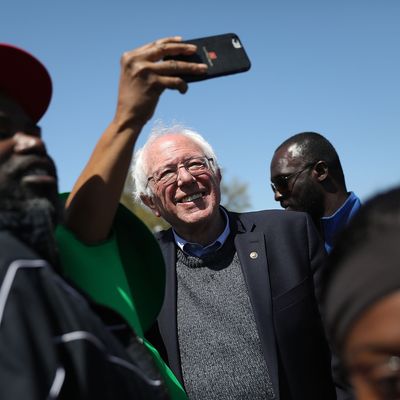
In the latest iteration of the relitigation of the 2016 Democratic presidential-nominating contest, Bernie Sanders said something critical about the Democratic Party this week, and people freaked out.
Bernie Sanders has triggered a backlash by making comments interpreted as an attack on Barack Obama on the 50th anniversary of the assassination of Martin Luther King.
The senator for Vermont appeared to criticise the first black US President as he branded the Democratic Party a “failure”.
Speaking in Jackson, Mississippi, he said Democrats had lost a record number of legislative seats.
“The business model, if you like, of the Democratic Party for the last 15 years or so has been a failure,’ said the Vermont Senator.
Sanders went out of his way to mention Obama’s brilliance, and in context it was reasonably clear he was talking about the Democratic Establishment, not necessarily the 44th president at the top of the party pyramid. But it was almost certainly the wrong place at the wrong time to make this argument, as actor Jeffrey Wright made clear:
Paul Waldman added to the criticism by suggesting that it was also an odd time to be flaming the Democratic Party for electoral incompetence:
Since Trump got elected, Democrats have won nearly every off-year and special election in sight, usually improving on their prior performance by 10, 20 or even 30 points. They are poised to win back the House — and maybe even the Senate. No one in either party doubts they are going to make huge gains at state and local levels this fall. Whatever else you can say about them, you can’t say they are not having success at the ballot box.
But then Waldman puts his finger on why Bernie Sanders is going to keep complaining about the Democratic Party even if it seems to be getting its act together, and moving pretty decisively in a progressive direction:
This is the essence of the Sanders brand; it always has been and always will be. No matter how much the party moves to the left — and it has moved a great deal in the last few years — there will never be a point where Sanders says, “I’m really pleased with where the Democratic Party is right now.” Because once he said that, there would cease to be any need for Bernie Sanders to exist.
To put it a tad more charitably, Bernie has always, for many decades, been a gadfly when it comes to Democratic politics, and it’s a mite strange to expect him to become anything else in his mid-to-late 70s. This is why he’s never joined the Democratic Party — he feels he can’t maintain healthy pressure on the old donkey if he’s in harness with it.
And you know what? That should be okay to regular Democrats. Bernie’s gonna Bernie, and most of the time that will consign him to limited influence in the party he’s criticizing from outside the ranks. As Waldman points out, his near-conquest of the party in 2016 was the produce of extremely unusual circumstances, and probably won’t recur in 2020, even if he does ignore concerns about his age, given a larger candidate field with fewer clear left-center fault lines. But any way you slice it, Sanders’s criticisms don’t necessarily show any “disarray” or deep identity crisis among Democrats. So long as Donald Trump is in the White House, the necessity of fighting him off and putting an end to this sad national experiment in white-nationalist populism or whatever you want to call it should keep Democrats unified when and where it matters quite well.






























